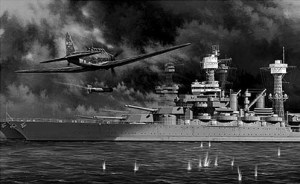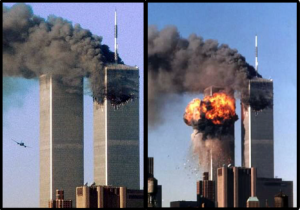A long time ago my parents were suddenly awakened one Sunday morning by a neighbor’s phone call. “Turn on the radio,” the neighbor pled with my father, apparently herself awakened by bad news.
My parents did, of course, and learned of the attack on U.S. naval forces in Pearl Harbor, Hawaii, on December 7, 1941. Though Europe had been at war since 1939, many Americans hoped to stay out of this latest European confrontation. Europeans had been fighting for centuries, many figured, and it needn’t concern us. Now it did. Americans are rightly skittish about committing their young men and women to battlefields, but not when their own country is bombed.
One of the few other times I remember such unity was after the terrorist attacks of September 11, 2001, when terrorists attacked the World Trade Center in New York City and the Pentagon in Virginia. Another plane crashed in Pennsylvania when passengers fought a fourth group of hijackers. I watched the newscasts that day on a TV screen at a U.S. consulate in Saudi Arabia, wondering how we would handle this awful challenge. Whether we correctly handled these attacks in the long run may be open to question, but for a long while, we were definitely united. Americans bought flags and gathered in patriotic groups and supported rescue groups and firefighters in New York City.
But how do we react to wrongs when they involve few of our own citizens, like the attacks in Israel and Gaza and Ukraine?
How do we remain united in working out these and other problems when we have such vastly different opinions about many issues, like abortion, aid for Israel, and immigrants?
Our country’s government is over 230 years old. We have almost foundered on different ideas, directions, and yes, sins, more than once, but we are still here. If we can learn one thing, it’s that we can continue only as we respect differences and continue to work together. We need each other, because none of us has all the answers.


 December 7, my calendar notes, is Pearl Harbor Day. The day commemorates lives lost in the attack on the U.S. naval base in Hawaii by Japanese forces in 1941. It led immediately to our entry into World II.
December 7, my calendar notes, is Pearl Harbor Day. The day commemorates lives lost in the attack on the U.S. naval base in Hawaii by Japanese forces in 1941. It led immediately to our entry into World II. In an article in the Foreign Service Journal (January, 2012), Margaret Sullivan recounted her early years in China as the daughter of an American missionary teacher when Japanese forces took over China. Ms. Sullivan remembers a Japanese soldier smiling at her family as they went through a checkpoint.
In an article in the Foreign Service Journal (January, 2012), Margaret Sullivan recounted her early years in China as the daughter of an American missionary teacher when Japanese forces took over China. Ms. Sullivan remembers a Japanese soldier smiling at her family as they went through a checkpoint.